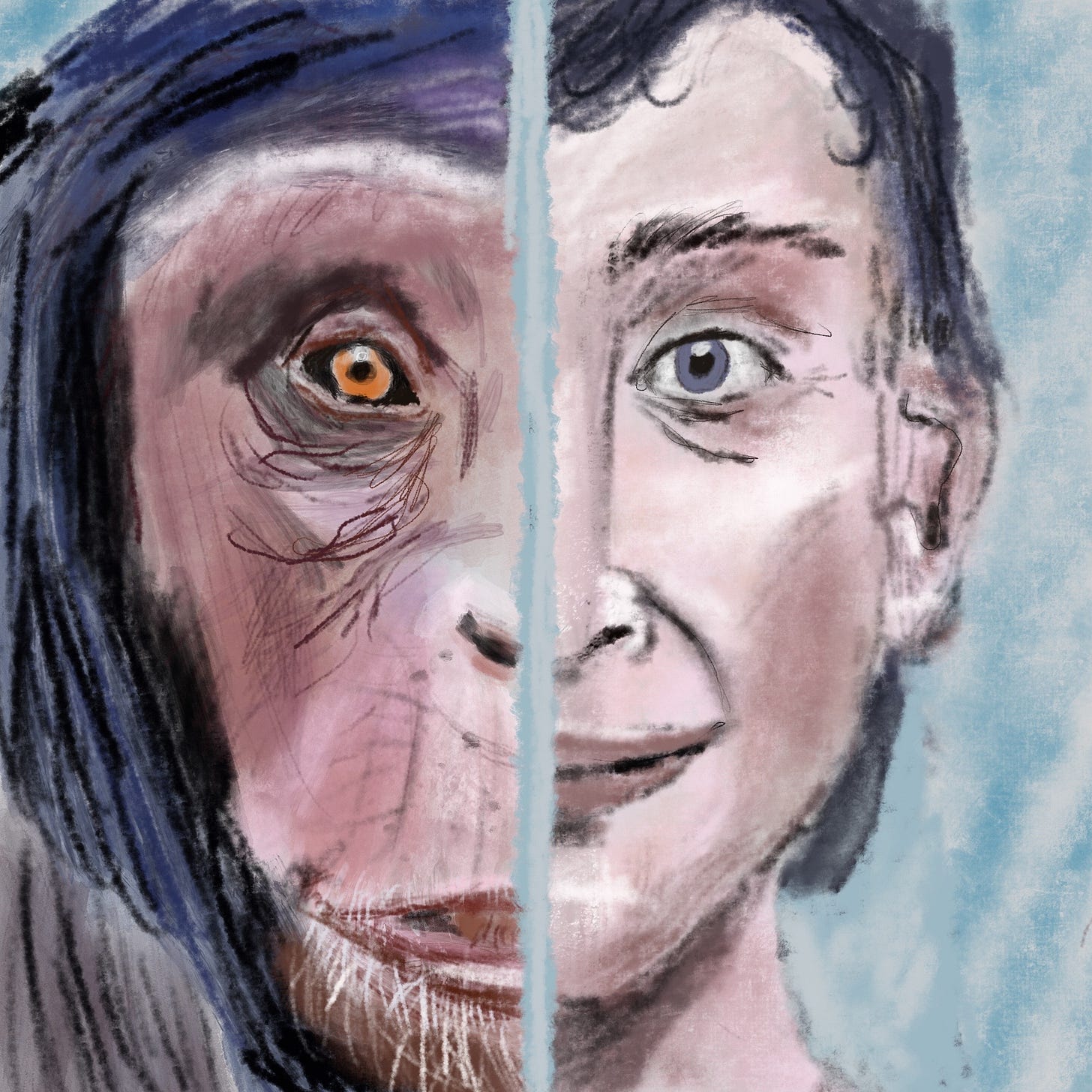We are still just hairless apes
Old primate, new tricks.
I know that most spiders are not a threat to me, but I still jump involuntarily and get a spike of adrenaline when I notice one crawling around my apartment. The fear is not rational. It is instinctual and very difficult for me to overcome, even though I consciously want to overcome it.
Hypothetically,1 our ancestors were not always afraid of spiders. At some point, a mutation occurred which caused a fear of all spiders, and individuals with this mutation survived to reproduce just a bit more often than those without it — so the mutation spread slowly through the population.
Natural selection doesn’t “care” about rationality, efficiency, or accuracy — it only “cares” about reproduction and survival rates.2 Being afraid of all spiders is irrational, but it works. It significantly lowers your chance of dying from a spider bite.
Evolution works extremely slowly, over thousands or millions of years. In contrast, technology progresses very fast, and is accelerating. This means our environment is changing faster than we can adapt to it — we are living in circumstances we were not “designed” for.
I think this contributes to many problems we face in day-to-day life. Take something like smartphone overuse — I and many others frequently find it difficult to stop doomscrolling. At work I place my phone in a closed cabinet (out of sight, out of reach, out of mind) to avoid distraction.
We have not evolved to handle smartphones responsibly. We haven’t evolved to handle any consistent, plentiful source of dopamine, really. Our hominid ancestors lived in a world where little boxes that give you pleasure on demand in an instant didn’t exist and the only streaming service was CampfireStories+.3
Why do I chronically eat so much sugar even though I consciously know that it’s bad for me and effectively low-grade poison? Well, our ancient ancestors hundreds of millions of years ago lived in a world where they constantly worked to obtain their next meal, so to them sugar was a good thing! Sugar has a high energy density and is easy to digest. Thus, their descendants (which include many species besides humans) evolved to find its taste pleasurable.
Fast-forward to the present day. Due to the technological progress Homo sapiens has made in agriculture, sugar is plentiful. But because we transitioned from non-plentiful sugar to plentiful sugar so quickly (on the order of hundreds of years), natural selection hasn’t had time to catch up,4 and we find ourselves in a sticky situation where people like me are addicted to eating large amounts of sugar. The reward mechanism in my brain for eating sugar persists even though it has changed from being useful to harmful!
While it’s easy to fall into the trap of trying to explain everything this way,5 there are lots of problematic human behaviors that are worth examining through an evolutionary lens. I think sexism is a great example. Social inequality between males and females was how our evolution happened to pan out, and while it may have been a semi-optimal solution for our animal ancestors millions of years ago, it isn’t anymore. Modern humans live in a different world, and sexual dimorphism is way less important now. Technology and education are naturally equalizing forces.
What used to be normal masculinity—high aggression, violent tendencies, total social dominance — is now toxic masculinity, and for good reason — it’s actively harmful in the modern world for males to behave exactly like they did thousands of years ago. I don’t know if it was helpful to behave like that back then, but I do know it’s not helpful to behave that way now.
We live in a world we are not adapted to. If our DNA is like an old, unmaintained programming language, then our technological advancements are like a huge library full of extra features which use ridiculous workarounds to circumvent the jankiness of the language.
In the end, we are still just hairless apes, and we have lots of technical debt — but that doesn’t mean we can’t succeed! It just means we have to hotfix our own evolutionary history so we can achieve goals that natural selection could never have even dreamed of.
If you have thoughts, opinions, witticisms or criticisms to share, I’d love to hear them.
I am not an evolution expert, expect qualifiers like this one sprinkled through the article. If I get something wrong, please let me know so I can correct it.
“Care” is in quotes here because natural selection can’t “care” about anything — natural selection isn’t a force or an entity with a direction or goals, it’s just a phenomenon. It’s a label assigned a thing that happens sometimes. Natural selection only optimizes traits the bare minimum needed to outcompete other organisms or the environment. Evolution is lazy!
“I heard that new Epic of Gilgamesh show is supposed to be pretty good”
That’s assuming it could even could catch up — modern humans are mostly exempt* from natural selection because we’ve acquired massive power over our environments, so environmental pressures aren’t nearly as big a deal as they once were. The number of kids you have is no longer dependent on fitness or status.
* not totally exempt, though. For example, impoverished people often have less access to birth control, so they frequently have more children than rich people do. Some religions value fertility, too, so religious people frequently have more children than non-religious people.
“When all you have is a hammer, every problem looks like a nail.”



Ofc you would write about "toxic masculinity" with a "he/him" header on your bio. You ppl got nothing to say actually, you just throw some words around some keywords. So predictable.